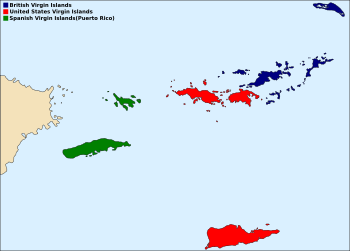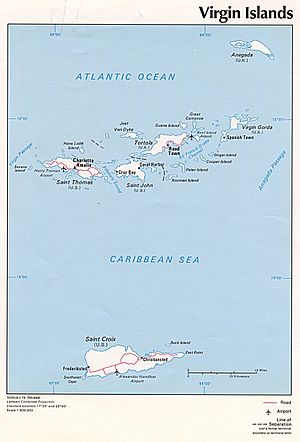Virgin Islands facts for kids

|
|
| Geography | |
|---|---|
| Location | Caribbean Sea, Atlantic Ocean |
| Coordinates | Lua error in Module:Coordinates at line 614: attempt to index field 'wikibase' (a nil value). |
| Archipelago | Leeward Islands |
| Insular area | United States Virgin Islands |
| Insular area | Puerto Rico |
| Overseas territory | British Virgin Islands |
The Virgin Islands are a group of islands in the Caribbean Sea. They are located where the Caribbean Sea meets the Atlantic Ocean. These islands are part of a larger chain called the Leeward Islands.
The Virgin Islands are divided into three main areas, each governed by a different country:
- The British Virgin Islands, which are a territory of the United Kingdom.
- The United States Virgin Islands, which are a territory of the United States.
- The Spanish Virgin Islands, which are part of Puerto Rico. Puerto Rico is also a territory of the United States.
Contents
Why are they called the Virgin Islands?
The famous explorer Christopher Columbus named these islands. He called them after Saint Ursula and the 11,000 Virgins. This long name was later shortened to just "the Virgins."
Today, the official name for the British part is "the Virgin Islands." The U.S. part is officially called "the Virgin Islands of the United States." However, most people simply call them the British Virgin Islands and the U.S. Virgin Islands.
A Look Back: History of the Islands
Early Settlers and European Arrivals
Long ago, the Virgin Islands were home to native people like the Arawaks and Island Caribs. Sadly, many of these original inhabitants did not survive after European colonists arrived. They faced new diseases, forced labor, and wars.
Later, European settlers came to the islands. They started large farms, known as plantations, where they grew crops like sugar and tobacco. To work on these farms, they brought many people from Africa as enslaved laborers. Today, most people living on the islands are descendants of these African people. They share a rich African-Caribbean culture.
Changing Hands: How the Islands Became Part of the US
Some of the Virgin Islands used to belong to Spain. In 1898, after the Spanish–American War, Spain gave these islands to the United States. This included the islands that are now part of Puerto Rico.
Later, in 1917, the United States bought more islands from Denmark. These were known as the Danish Virgin Islands. The U.S. paid $25 million in gold for them. These islands then became what we now call the United States Virgin Islands.
Who Lives on the Islands?
The Virgin Islands have a total population of about 147,778 people.
- About 104,901 people live in the U.S. Virgin Islands.
- Around 31,758 people live in the British Virgin Islands.
- About 11,119 people live in the Spanish Virgin Islands (Puerto Rico).
In the British and U.S. Virgin Islands, about three-quarters of the people are of African-Caribbean heritage. In the Spanish Virgin Islands, most people are of European descent from Puerto Rico, but there is also a notable community of African-Puerto Rican heritage.
The main languages spoken are English and Virgin Islands Creole in the U.S. and British Virgin Islands. In the Puerto Rican territory, people mainly speak Spanish.
The most populated island is St. Thomas, followed closely by St. Croix.
| Name | Sovereign State | Subdivisions | Area (km2) |
Population (2005 est.) |
Population density (per km2) |
Capital |
|---|---|---|---|---|---|---|
| British Virgin Islands | United Kingdom | Districts | 153.0 | 31,758 | 207.6 | Road Town |
| Spanish Virgin Islands (Puerto Rico) | United States | Barrios | 165.1 | 11,119 | 67.3 | San Juan, PR |
| United States Virgin Islands | United States | Districts | 346.4 | 104,901 | 302.8 | Charlotte Amalie |
| Total | 664.5 | 147,778 | 222.4 |
Driving on the Islands
When you drive in the British and U.S. Virgin Islands, cars drive on the left side of the road. This is different from many places, especially since most cars on the islands have their steering wheels on the left side, like cars made for driving on the right. In the Spanish Virgin Islands, vehicles drive on the right side of the road, just like in the rest of Puerto Rico and the United States.
Images for kids
See also
 In Spanish: Islas Vírgenes para niños
In Spanish: Islas Vírgenes para niños



